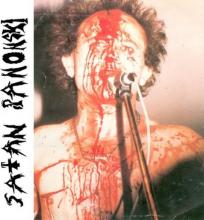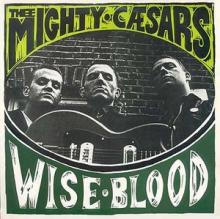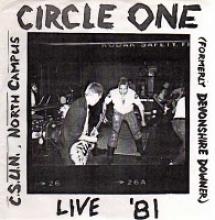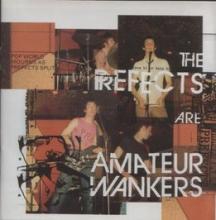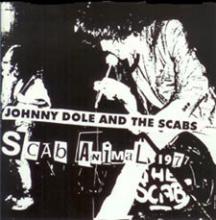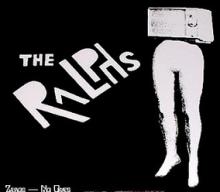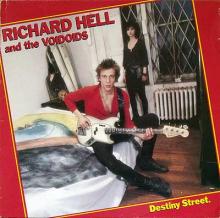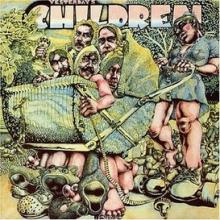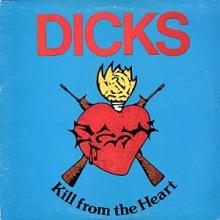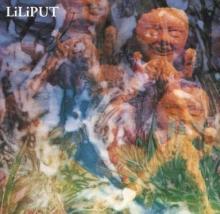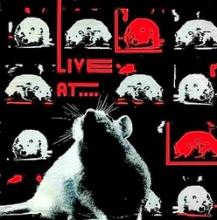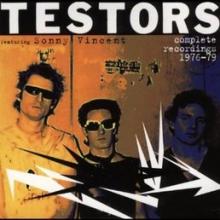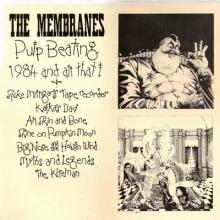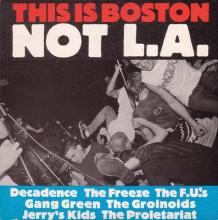November 2010
Thee Mighty Caesars: Hail Early Caesars!
Of course, remaining completely detached from pervasive tastes over there in the UK is pretty impressive when considering the expansive backlog of records Childish has had a hand in. But it’s also kind of nutty that one guy has seen fit to record in roughly the same mode for just about thirty years and folks still eat it up – I’m one of them.
Anyway, after the Milkshakes fell apart, it didn’t take Childish too long to soldered together the group which would constitute Thee Mighty Caesars – and no, I have no idea what all the ‘Thees’ are a bout. Ask Thee Oh Sees, maybe.
During the first two years of the band’s existence it issued some ridiculous number of singles and no less then three albums – or four depending on what dates you dig up from the interwebs and not the dust jackets.
Tandoori Knights: Garage as Seen through the Eyes of Brown Folks from Canada
But in addition to digging up old treasures, the New York based imprint issues new groups, who for the most part have an eye to the past, it’s recordings and its heroes. So, in putting work out by Arish Ahmad Khan, better known to garage enthusiasts as King Khan, and his various pseudonyms, Norton’s in effect cementing more music’s historical import. At some point in the next few decades, it wouldn’t be too much of a shock if a compilation cropped up with a number of disparate players redoing Khan’s various compositions. There’re surely enough to go around.
Either way, this latest project called Tandoori Knights plays on Khan’s background, he’s joined by Bloodshot Bill whose own album as the Ding Dongs is being sent off into the world by Norton as well.
Lora's Essential Logic
Either way, as with many of those early punk groups, line ups were pretty volatile and there didn’t seem to be any real end game in sticking around in one group for to long – stasis and all. You know. Either way, when Lora Logic and Poly Styrene called it quits with that aforementioned group, it wasn’t long before Essential Logic sprung up.
What’s weird is that there isn’t too great a difference between this latter group and the X Rays. Granted, funk and dub get ratcheted up a bit, but that seemed par for the course. It mirrors, to a certain extent the changes John Lydon would go through when moving from the Sex Pistols to Public Image Limited.
Blinders - "Spend the Night With You" (Video)
These folks come out of the same Louisville, Ky scene that gave us the Endtables. This work right here's just as good in a more good-time kinda way. It's pretty easy to tell that whoever these folks are/were - there aren't even any images accompanying the video - they were havin' fun.
Simple Minds - "Pablo Picass" (Video)
Apart from the fact that Pablo ranks as one of the last recognizable faces in art, there's not a great reason for so many punk/garage related acts writing songs about him. Of course, this early Simple Minds' track refutes what the Modern Lovers figured. Either way, both rank pretty high in the realm of unneeded art commentary by musicians.
Circle One: Let's (Illogically) Blame Rollins
But the early hardcore scene in SoCal, much like in NYC, was riddled with violence and shows were frequently places for music as much for settling scores. In reading various punk histories, including Steven Blush’s American Hardcore, a gang aesthetic gets related. And while that might be a bit much, there’s something to it in light of the Youth Brigade film Let Them Know.
And while that last band seems more important for what it did behind the scenes than for the music it actually recorded, first hand accounts are pretty unrelenting in depicting a few groups – Circle One for sure – as a bunch of tough guys who insinuated themselves into the scene. All of this could be layed at Rollins’ feet. After all, who was a tough guy in the manner he was before a member of Black Flag? I dunno, no one?
The Prefects - "Things in General" (Video)
This is simply a jangly punk track. But for whatever reason - and it's not the track's obscurity - it ranks up there with any number of other top tier UK acts. Does anyone else here the same sorta guitar style at work here as in Major Accident? Yep.
The Prefects: It's All Over Too Quicly
Johnny Dole and the Scabs: Apparently, Punks want to get Drunk
It’s not at all necessarily completely detached from the Brit punk thing. At the same time, though, there’s a reason all that funky post-punk stuff cropped up in the UK and not down under. Partly, that’d be due to different immigrant populations surrounding each disparate scene, but music is a visceral thing as much as a cultural thing. And for whatever reason (we could easily pin it on the criminal element), Aussie bands subjected audiences to a more straightforward, and in some cases more aggressive, take on the genre than elsewhere – Sick Things for instance.
Either way, Johnny Dole and the Scabs showed up in time for the feeding frenzy that prompted major imprints to sign up their very own punk band and crank out poorly produced albums just to cash in. Because of that it seems as if the ensemble were caught up in a professional jive that they weren’t really prepared to engage with.
The Ralphs: (Weirdo) Punks from Down Dallas Way
Richard Hell: Disappointing Second Takes
Either way, after helping solidify the direction of Television alongside Tom Verlaine and subsequently an early line up of the Heartbreakers, Hell went off on his own to write one of the definitive songs of the initial wave of punk stuff. “Black Generation,” although endlessly interpreted in different ways, remains a readily identifiable landmark in the genre’s develop, both musically and lyrically. Basically, it’s just good stuff.
Parasites Of The Western World: A Lesser No Wave
I suppose, the Parasites of the Western World aren’t in the same realm of music as DNA or whoever you’d care to pluck from that New York scene. And considering that this duo - Terry Censky and Patrick Burke – sussed out this conglomeration of noises up in the Northwest, Portland to be exact, it’d be fair to cut ‘em a bit of slack.
The group’s first release spurt out around 1978. And while that’s not early for New York, Los Angeles or other major, metro hubs, it’d be difficult to name another group or two from Portland with an eye towards these sorts of aural abstractions. Maybe that’s simply my own ignorance speaking, but there you have it.
Beginning with “Mo,” listeners might figure the stuff to follow remains in line with the aural proclivities on display here. The punky tempo, grinding and phased guitar – not to mention that barely tenable guitar solo – hint at what the confluence of aggressive rock stuffs and utter noise should be. Unfortunately, there aren’t too many other moments resembling this one. And in fact, the following song winds up being a two minute rumination on a single bouncing snatch of reverb. While that’s all well and good in theory, it doesn’t do too much in the realm of entertainment. Arguments can be made for this being art. But I don’t listen to art, I listen to music.
The Dicks and Austin's Hardcore Scene on the Run
The Big Boys were around at least a year earlier and mined a surprisingly similar sound as the Dicks. But we can all just chalk that up to each group springing from the same scene. Both ensembles felt it necessary to include more than a passing wink and nod to other musical genres – funk being an obvious influence. The Minutemen, a San Pedro based SST group, weren’t too far away from settling on roughly the same conflagration of noise, politics and rhythm – that group, though, also benefited from living in a town not too far away from Los Angeles’ huge scene.
When considering the Dicks and the Big Boys, the latter of sports a more sprawling discography despite not being picked up by a major-indie label or high tailing it outta town, it becomes difficult to understand each group’s current position in punk culture. Given the fact that the Big Boys, as fronted by Randy "Biscuit" Turner, were serious purveyors of queer culture and guitarist Tim Kerr has gone on to a successful career as producer, artist and all around good dude, there should be that yawning gap in popularity. Who doesn’t like fat guys in drag? No one.
Exerting Femme Punk: Kleenex x Lilliput
Kleenex and LiLiPUT are not the greatest, early punk related group comprised by women. Greil Marcus might disagree. And I can’t claim any sort of total knowledge regarding this specific sub-strain of pop musics, but after hearing these guys girls hyped for so long and then getting an earful, it’s not too difficult to figure that someone, somewhere surpassed this troupe
Classic Compilations: Live at the Rat
Willie 'Loco' Alexander – This gentleman, outside of Boston at least, is probably better known for replacing Lou Reed in the Velvet Underground as the band was going to pot being led by the Yule brothers. So, it might not even count as the Velvets. No one was left, just ringers. Either way, the reason Alexander got a shot at the big time was his time the group anthologized here. At points, it’s not difficult to hear subtle similarities between his voice and Reeds. But not enough to warrant one replacing the other. Beyond that, though, the music the Boom Boom Band works up as backing doesn’t get too far past hard rock ala Aerosmith. And no, it’s no a coincidence that both bands hail from the same joint. Not at all. Either way, Alexander opening Live at the Rat, despite the song being about the venue, doesn’t make for a good start.
Henry Rollins Gets Weird in a Record Store (Video)
Sonny Vincent an the Testors: A Boring History Lesson
The Testor’s are a name, as is singer Sonny Vincent, that resounds throughout all of punkdom as some sign post of the genre’s spreading from some insular New York thing to the world wide phenomena that we all know today.
Before the onslaught of repressed punk obscurities, the Testors existed in a corner of the punk kingdom that only a few folks had been exposed to. Basically, this entire story can be applied to San Francisco’s CRIME as well. That West Coast band, for the most part, worked up a bunch of middling punk inflected tracks and cemented a legacy that easily surpassed the music’s actual importance. At this late date, copping that CRIME discography has got to be a tremendous bummer.
And so is gettin’ an earful of the Testors’ Complete Recordings. In that aforementioned review, there’s mention of a nation wide tour with Cleveland transplants the Dead Boys. And the connection makes total sense. That band, sporting the always charming Cheetah Chrome on guitar, really released only a handful of tracks that could today exist independent of the band’s legacy and still be afforded too much deference. That’s not to diminish anyone’s historical contributions to the genre, that’s just how time works. What was once shocking is no longer a surprise.
